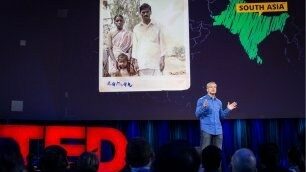Talking about Gary’s TED Talk

By Rebekah Hill, Marketing Communications Executive IJM UK
We’ve all seen the adverts on telly. The children from Africa, with flies on their face. The orphaned baby who isn’t getting the AIDS medication they need, the young boy with a distended stomach, the little girl drinking dirty water. We see the poverty, the dirt, the disease. We see the pain and sadness on those children’s faces. And our hearts break. We know those children don’t deserve it, that they deserve better and deserve our help.
As human beings, it is natural for us to feel compassion, to empathise with those in pain. As Gary Haugen recently claimed in his TED talk, "the fight against global poverty is probably the broadest, longest-running manifestation of the phenomenon of human compassion in the history of our species.”
But there is another - albeit difficult - truth. Dare we acknowledge the hidden question: can poverty really be beaten?
Perhaps controversially, Haugen suggests that the answer is no. At least, not until a deeper problem is solved first: the problem of violence.
What good is it to build a new school, if the girls are raped when walking to and from it? What good is it to provide micro loans, if the community business owners are rounded up and wrongly imprisoned? What good is it to build a new well, if the community leaders don’t allow free access to it?
Each of these are good things in themselves. Child sponsorship, micro loans or traditional foreign aid each play an important part in addressing global poverty. But they will not successfully stop the violence, because they were never intended to. And without this, their attempt to address poverty will never truly be effective.
Haugen suggests that up until now, we have missed this problem because, "we can’t focus our compassion on what we can’t see.” We see the slums, the distended stomachs, and the dirty water. But we don’t see the rape that goes on behind closed doors, or the widow who is threatened in her home by a family member with a machete.
Worse still, we don’t see the fear that this violence instils. The fear that stops a girl walking to school and accessing the education she needs for a better life. The fear that stops parents saving for their child’s education, because they know the police could come and simply take that money one day with impunity.
But the good news is that this can, and is, changing. By addressing the issue of violence, by protecting the poor from abuse and exploitation in the first place, we can begin to improve the foundations that make all the other measures – the food, the clean water, the medication – effective. Then, we may be able to beat poverty too.